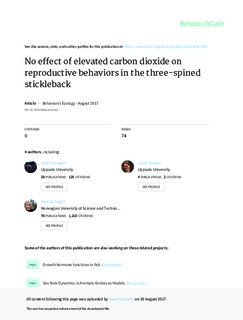No effect of elevated carbon dioxide on reproductive behaviors in the three-spined stickleback
Journal article, Peer reviewed
Published version
Permanent lenke
http://hdl.handle.net/11250/2478273Utgivelsesdato
2017Metadata
Vis full innførselSamlinger
- Institutt for biologi [2573]
- Publikasjoner fra CRIStin - NTNU [38070]
Originalversjon
10.1093/beheco/arx112Sammendrag
Ocean acidification, the reduction in ocean pH resulting from anthropogenic emissions of carbon dioxide (CO2), has been predicted to alter the behavior of fishes. During experimental exposure to CO2 concentrations projected for the year 2100 (~1000 µatm), fish have been reported to display disturbances in activity, learning, behavioral lateralization, and even attraction to predator cues. Reproductive behaviors have received far less attention, despite an intensive research effort on ocean acidification and its ecological importance. Here, we investigate whether elevated levels of CO2 affect reproduction in breeding pairs of the three-spined stickleback, Gasterosteus aculeatus, a model species in behavioral, evolutionary ecology, and environmental toxicology. We found that males under both present day levels (400 µatm) and future levels (1000 µatm) of CO2 developed normal sexual ornaments, pursued normal nest building activities, exhibited similar levels of courtship behaviors and displacement fanning, and had the same mating probability. Moreover, fanning behavior during the paternal care period followed what is expected for the species for males from both treatments, and there was no effect of treatment on the numbers of offspring produced. This study is the first to investigate the effect of elevated CO2 on the complete breeding cycle in detail, studying an array of highly fitness-relevant traits. Our study showing surprising resilience of fish reproduction is an important contribution in order to realistically predict the impacts of future ocean acidification.
